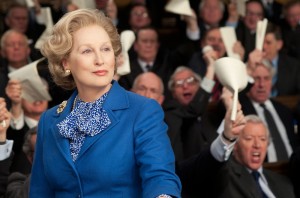Streep Is Single Strength of ‘The Iron Lady’
The most prominent actress of her time playing one of the most controversial leaders of the 20th century — as an intellectual study in politics, it sounds like a sure thing, doesn’t it? Nevertheless, the presentation of The Iron Lady is hardly sharp as a steel trap.
In happier days, Margaret Thatcher (Meryl Streep) was one of the world’s most powerful women. Now elderly, alone and battling severe dementia in her golden years, the former British prime minister has little to do but reminisce about what has brought her to this point in her life. After a difficult time in her youth edging her way into the male-dominated world of politics, Thatcher’s determination to improve the state of the United Kingdom has turned into a daily struggle just to recall the members of her house staff. The single comfort is the memory of her late husband, Denis (Jim Broadbent), whose presence in her house has yet to fade.
With her dedication to throwing herself into whatever part she plays, the depth of Streep’s talent seems to be limitless. Her flawless British accent and portrayal of the shift in Thatcher’s speaking style as she improves her composure are notable enough, but the true crowning achievement is her handling of the precarious job of making the aged PM just as real and thoughtful as her younger self. Compared to a callow Alexandra Roach as Thatcher in her 20s, it must be harder than it looks. Broadbent gives an affable effort as the man who — mostly — isn’t there. As a figment of his wife’s imagination, Denis is both a comforting and menacing entity, helping her remember the good times of their relationship, but also all the mistakes she made both as a spouse and mother and in government. At least he visits. Daughter Carol’s (Olivia Colman) tending to her mum is shown as halfhearted at best and son Mark is out of the picture entirely.
This depiction of the Thatcher family begs the question of how Maggie could have straightened out the UK when she can’t keep her own private life together, yet there’s no underlying argument to the contrary. Damian Jones’ screenplay gleans over so much of Thatcher’s rise to power from the House of Commons — coping with demeaning debates such as “Methinks the lady doth screech too much” — leading up to her 1979 election, her dismissal of union strikes, and the handling of the Falkland Islands invasion that we only get little snippets of each step in her career. This prevents the biopic from becoming dull and drawn-out, but there’s not enough to engage the crowd. Phyllida Lloyd’s expertise in theatrical direction may have served her well with Streep in the film version of Mamma Mia!, but her dependence on extended close-ups is juxtaposed with a metaphorical deep focus of sorts, wherein the past and present coincide and neither seems all that important as a result.
This is a movie all its own, but not in a beneficial way. It’s not a feel good true story like The King’s Speech or a eulogy of a recent British figure and a bygone era like The Queen. Even the balanced-to-a-fault method of Oliver Stone’s W. had more of a purpose behind it. Streep does a fine job getting into character, but this could be any old woman living with both pride and regret and it’s hard to tell if Lloyd chooses not to acknowledge how remarkable Thatcher’s career really was, or if she has some ulterior motive in showing her as a feeble-minded old biddy.
Considering the woman at the heart of “The Iron Lady” was on such friendly terms with Ronald Reagan, and left behind a very similar legacy, it seems appropriate that the film about her would split so many people. Those who considered her a champion of conservative politics will likely see this as an insult to the one-time resident of 10 Downing St., while those who reviled Thatcher’s often arrogant and stubborn tactics in office will deem it too soft a criticism. On the plus side, at least Streep looks smashing in that famous wardrobe complete with pearls.
Rating: 2 out of 4 stars


